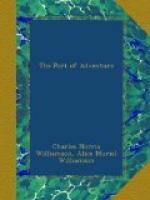They saw the park and the millionaires’ houses and the orange-packing, passing on the way picturesque little towns, with Indian and Mexican names, which charmed the eyes and ears of Angela. And always the air was sweet with scent of orange-blossoms, roses, and alfalfa, the life of the country. Once, at Redlands, Nick excused himself and jumped out of the car at a shop. He was gone three or four minutes; but when he came back he said nothing of any purchase.
It was only when he was bidding Mrs. May good night at her hotel door that, with a schoolboy air, he pulled a small package out of his pocket.
“Talking of typical Californian things,” he said, trying to seem careless, “here’s one. I thought, as it’s only a little bouquet in a bottle—a few flowers distilled—you might accept it. But if you want to give it back, I’ll take it like a lamb. It’s—because you love California—I want you to have it. Don’t open the paper till you get indoors. And you’ll send me word whether you can go along farther in the country of make-believe?”
“Of course. I’ll telephone.”
“Early enough for us to start, if—if the answer’s yes?”
“As soon as I wake up. Will that do?”
“That will do. And let it depend on your dreams. I’ll trust my luck to them. Because dreams are in the country of make-believe; sometimes they are good—so good they make you want to go on and on. Besides, there’ll be the Morehouse letter. I bank on that. But more on the dreams.”
The letter had come. Angela found it when she got back to her hotel, and meant to read it at once, as a letter from so important a man deserved. But Nick’s package was in her hand, and she was tempted to untie the gold string.
Inside was a fancy bottle of perfume, bound round with quantities of narrow rose-coloured ribbon.
“Parfait d’Amour. Made of California Flowers,” announced the blossomy label. And Angela broke into laughter, repeating the name aloud, “Parfait d’Amour!”
She had laughed very often that day.
“He knew I wouldn’t give it back to him,” she thought. “That would be worse than keeping it and saying nothing.”
She put the bottle down on her dressing-table, and took up the letter from Mr. Morehouse the banker. It was a pleasant letter, extremely satisfactory from Hilliard’s point of view. It was evident that, in the two brothers opinion, there was no reason why she should not accept the services of Mr. Nickson Hilliard, in seeing California. The banker, who alone knew (and would not tell) that Mrs. May was the Princess di Sereno, said “Hilliard, who was to be introduced to you in New York if my brother had not been ill, is a man your father would have approved. You are not travelling alone, I understand, but have your servant. You can trust Hilliard as a kind of glorified guide, which he wishes to be, I understand, partly out of friendship for my brother




